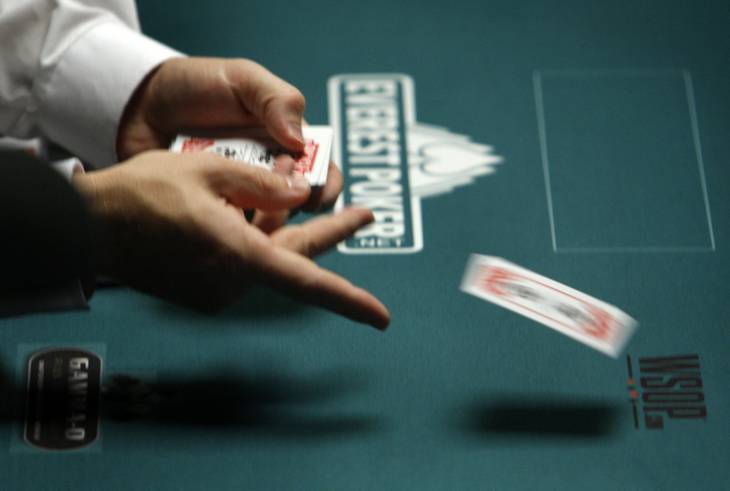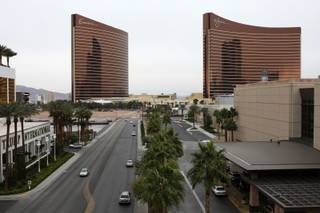Related coverage
Forget about the concept of "worker solidarity" when it comes to the battle under way over tip pooling at Wynn Las Vegas.
A group of Wynn casino dealers trying to block the company from sharing their tips with supervisors faces opposition in their lawsuit from, of all things, the powerful Culinary Workers Union.
The Culinary’s decision to side with Wynn in the legal fight has an attorney for the dealers complaining it’s incredulous that the Culinary is maneuvering against workers it doesn't represent. The dealers are represented by the Transport Workers Union.
The Culinary’s action could deprive the dealers of "a vital legal protection" they won when a state judge found that the tip-pooling policy violates state law, the dealers’ attorney, Leon Greenberg, told the Nevada Supreme Court last month. Greenberg’s complaints came in a filing opposing a motion by the Culinary and the closely associated Bartenders Union that they be allowed to file a friend of the court brief siding with Wynn in the dispute.
An attorney for the Culinary Union, however, said it’s entirely appropriate for the unions to participate in the case because the dealers' lawsuit threatens to upset scores of arrangements statewide in which workers have agreed to share tips with supervisors, including arrangements negotiated by the Culinary and Bartenders unions.
•••
For decades, dealers on the Las Vegas Strip were among the best-paid workers in the casinos, thanks to hefty tips. When tips were shared, they were shared among themselves.
Dealers traditionally weren’t represented by unions.
Then, in a revolutionary policy for the Strip, Steve Wynn decided in 2006 to include casino managers in the tip pool at his Wynn resort, and later at Encore when it opened. Wynn has said the policy is aimed at improving customer service by motivating supervisors to better serve gamblers and to make it easier to recruit bosses from the dealer staff.
Without sharing tips with managers, dealers in some cases would make more than their supervisors.
Wynn dealers were so upset by the decision, they joined the Transport Workers Union. The TWU’s successful unionization drive was another first for the Strip. However, Wynn’s contract with the union preserves tip pooling, and the TWU is not a party in the Supreme Court case.
Wynn dealers also filed complaints with Nevada’s labor commissioner, who upheld the tip-pooling policy. But the labor commissioner’s decision was struck down in November by Clark County District Court Judge Kenneth Cory. Cory ruled the tip-pooling policy conflicts with a state law that prevents employers from benefiting by requiring tips to be shared. In this case, Wynn benefits because the tips partially pay for higher salaries for Wynn supervisors, Cory found.
Cory’s ruling was appealed to the Nevada Supreme Court, which has yet to schedule oral arguments in the dispute.
At issue is some $5 million a year in tips that are being diverted from the dealers to management, Greenberg said.
Wynn Las Vegas argues that casino supervisors help ensure customer satisfaction, so it’s only right that they share tips.
•••
Since Cory’s ruling was appealed to the state Supreme Court on March 2, members of the casino and restaurant industries have — unsurprisingly — asked to file briefs backing Wynn. They have a vested interest in the outcome of the case.
If upheld, Cory’s ruling "could preclude employers from requiring servers to share tips with bartenders, bus persons or dishwashers," a proposed brief from the Nevada Resort Association and the Nevada Restaurant Association said. The ruling "raises important policy issues about whether courts should interfere with legitimate business decisions and, in doing so, discourage companies from engaging in creative methods for improving customer service, employment satisfaction or employment compensation."
The Culinary and Bartenders unions, which represent more than 60,000 workers in Nevada, argue that contrary to Cory’s finding, state law does not prohibit the Wynn dealer tip-pooling policy.
"The Legislature has left the many questions about how tip pools should be designed and administered to private contracting, either individual employment contracts or collective bargaining agreements," a proposed brief says. "The courts should not venture into an area which the Legislature, better suited to the task, has not seen fit to enter."
Greenberg, however, suggested that the Culinary and Bartenders unions are siding with Wynn as payback for Wynn awarding them a handsome 10-year contract in 2005.
"In contrast to the rewards it has showered upon" the Culinary and Bartenders unions, Wynn "has vigorously fought with the (dealers) and their designated labor representative, the Transport Workers Union," Greenberg wrote in his filing. "In light of such clear bias, and conflict of interest, the views of the (Culinary and Bartenders) are unworthy of consideration by this court. It is farcical for (the Culinary and Bartenders) to claim they advocate for the individual interests of tipped workers by supporting (Wynn)."
Richard McCracken, attorney for the Culinary and Bartenders unions, said that under the unions’ collective bargaining agreement with Wynn, some tip pooling with managers is allowed. That’s why a group of Wynn nightclub workers struck out last year in a lawsuit over similar issues.
"Our interest in this is advocating for the union," McCracken said.
He said the casino dealers’ lawsuit threatens to undermine longstanding practices in the hotel industry.
The Supreme Court hasn’t yet ruled on whether it will allow the unions and the casino and restaurant industries to participate in the case.

